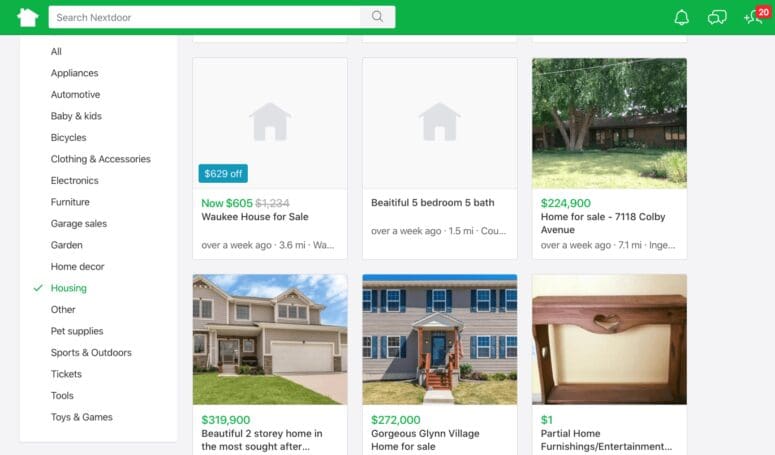6 Ways to Stay on Top of Your Local Real Estate Market Like Glue
- Published on
-
 Audrey Ference Contributing AuthorClose
Audrey Ference Contributing AuthorClose Audrey Ference Contributing Author
Audrey Ference Contributing AuthorAudrey Ference writes about real estate for Realtor, HomeLight, and other real estate trade publications. She lives in Austin, TX.
You’ll hear top real estate professionals echo two rules of real estate time and again. The first is that everything in real estate is negotiable.
The second is that real estate is local—period!
We’re talking super local, like down to the individual block in your neighborhood. Meaning prices… and inventory… and supply and demand, and all the dynamics that influence the ebb and flow of the real estate market could be different for you and your friend who lives across town.
So that’s why “How’s the real estate market?” is a loaded question that could make your agent’s brows furrow. “Well, where we are…” you’ll hear them say. Because what’s happening in the national news reports might not reflect what’s happening in their neck of the woods, contrary to popular belief.
What’s all this matter to you, anyway? Well, knowing your local real estate market inside and out helps you get a couple of critical things right when you sell your home: pricing and timing.
If you underprice your home, you’re leaving money on the table. But overprice and you could end up with the dreaded stale listing. Alisha Simpkins, a top 1% selling agent in Chico, CA, explains that a home is “going to sell for the most amount of money in the first 30 days.” If it sits longer than that, you’re looking at having to make a significant price drop to generate buyer interest.
The timing piece of the puzzle matters, too. “They need to know: what’s the seasonality of their market,” says Barry Kunselman, a top 3% seller’s agent in Denver, CO. “In Colorado, by July they’ve actually missed the market.”
So how do you get this oh-so-important knowledge? Here are 6 ways to stay on top of your local real estate market that the best real estate agents stand by and use themselves to keep tabs on their area.
1. Talk to a real estate agent who’s already done the work for you
Like every other industry, real estate has become very data-driven in the last few years. Real estate agents have access to sophisticated tools that help them gather and interpret local data. A lot of that isn’t stuff you can easily DIY.
“When you do it yourself, it’s challenging,” says Kunselman. “Your resources are very limited.” Brokerage firms have complex algorithms to crunch all kinds of data, as well as networks of professionals to reach out to for opinions.
The good news is, all you have to do is ask. Any agent worth their salt will be happy to give you snapshot of your home’s current value without any commitment to working with them. Most will happily give you up-to-the-second information about the market, too.
In fact, when you interview agents to help you sell your home, compare their market analyses to get a sense of whether they’ve got their thumb on the pulse of the real estate market.
An agent or broker will be your best source for local data, so don’t be shy about approaching a few and saying something like:
“I’m hearing that across the country, home prices are going up and it might be a good time to sell. Is that the case for [your neighborhood/city]? What market trends are you seeing in the area, and where do you see our market going in the next six months?”
2. Look at comps, but be sure they’re the right comps
One way that agents price properties is by doing a CMA, or comparative market analysis. At its simplest, a CMA relies on “comps” or comparative properties to accurately price your home. A house is a comp if it is similar enough to your house that you can reasonably assume yours will sell for a similar price.
You want to look on a real estate listing site like local public-facing MLS sites or Zillow and find recently sold properties near you. The more recent the better, but don’t go any older than 30-60 days.
The closer to you the better, too. You’re looking for homes that are comparable in as many ways as possible: the same number of bedrooms and bathrooms, square footage, condition, yard size, and any other variable that can affect the price.
Let’s say you’re selling your two-bedroom, two-bath, 2,000-square foot home in Tyler, TX. Here’s what a comp search on Zillow would look like:

If you can’t find close matches, it takes some market knowledge to know how much to add or subtract to the price for things like an extra bedroom or a recently-updated bath. Looking at the wrong comps can be worse than doing no research at all.
Kunselman explains that he frequently gets clients who see a house down the street sold for $400,000, so they think theirs is worth same amount. But if the homes aren’t similar enough, that’s simply not true. If the owners that house down the street just remodeled the kitchen and yours is a little older, you can’t expect to get the same price.
If you can find three or four similar homes to yours, that will give you a good range for what it’s currently going to sell for.
3. Keep your eyes peeled around the neighborhood
If you see yard signs popping up, that’s the time to be neighborly and find out some details a real estate agent might not be able to get—things like how busy open houses have been, what kind of interest the listing generated, or what people shopping in the neighborhood are on the hunt for.
You’ll also be able to tell whether a home flies off the market in days or sits stagnant for months, and price your home accordingly. Talk about hyper-local—walking your dog can be an information-gathering expedition!
Even just knowing the asking price can help you. While CMAs use recently sold properties to determine value, looking at asking price is useful in another way.
According to Kunselman, looking at trends in asking prices can help you see which way your neighborhood’s market is trending.
Nextdoor is another great resource for insider neighborhood info. Not only do many sellers put their listings on Nextdoor, it’s likely that your neighbors would be willing to answer any questions you have about their experiences selling their homes.
Check your Nextdoor newsfeed under the “Housing” category to browse listings.

4. Read local real estate media
Another way to stop on top of your local market is to keep an eye on your local media. Read the paper—whether it’s your city’s paper, or a paper specific to your neighborhood—because they’ll often have real estate trend pieces.
Blogs are another great resource. If you live in a bigger city, you might have a Curbed reporting on your real estate scene. Patch sites exist for even smaller cities, and often have great real estate reporting.
And then there are the hyper-local neighborhood blogs. You may or may not have one for your area, but Google your neighborhood to find them. For example, Candy’s Dirt has the real estate gossip from every Dallas neighborhood before the bigger sites pick up on it.

Your neighborhood may also have a list serve for residents—get on that if you can. Of course, this is another area where Nextdoor is helpful, too.
You want to get as much local news as you can, so that you get a handle on what’s happening. For example, if a big development project is slated for a nearby area, that could push your real estate values up (or bring them down temporarily, if the construction causes transit problems.)
If you live in a city where people rely on public transportation, new bus routes or light rail stops could mean a rise in your home’s value, while planned work (like the multi-year L train closure in Williamsburg, Brooklyn) could hurt.
Even small things like increased trash pickup, construction on your closest major highway, or new restaurants and coffee bars moving in can give you a sense of whether your neighborhood is set to be the next hot thing or whether it’ll be cooling off a bit.
5. Understand your market’s timing
Every market has a busy season and a slow season. In Denver, for example, Kunselman explains that things start to heat up in the spring, then peak by July Fourth. Sellers that time their listing poorly won’t get the best price for their home.
You want to know the differences between trends—is the market going up overall?—and seasonal cycles. If you’ve just started watching the market, you might mistake a normal, seasonal downturn for an overall downturn.
This is why looking at a few years’ worth of data is useful and also why talking to a real estate professional who has gone through the cycle a few times can help you understand what you’re seeing.
Ask your agent to share some real estate transaction data (home price, inventory, days on market) from the MLS with you.
You can also check out the S&P CoreLogic Case-Shiller Home Price Indices, which break down historical home price trends for major metros dating back to 1987.
The timing will be different for every location, and even different from neighborhood to neighborhood. For example, in really cold places, people tend not to shop in the winter. But in Miami, selling season starts in January. In neighborhoods with lots of families, late spring and early summer are the busiest times, because people want to be settled before school starts in the fall.
Knowing when the best time to sell a house is in your market is crucial for your overall sales plan.
Source: (toeytoey/ Shutterstock)
6. Stay in touch with the agent who sold you your home
One of your best resources for knowing what’s going on in your neighborhood (and with your specific home!) is to keep in touch with the real estate agent who helped you buy it.
They know the house and the neighborhood, and it’s their job to keep on top of what’s happening. In addition to reaching out to new agents for information, check in with your buyer’s agent every six months or year for updates.
They’ll be more than happy to let you know what they’ve been seeing, and you already know from working with them that they’re a great resource. They know your home’s quirks already, so can give you a realistic picture of what it’s worth.
How to stay on top your local real estate market
Armed with as much data as possible, it’s easy to stay on top of your local real estate market. When you come in prepared, pricing your home and getting ready to sell is going to be that much easier. A little research now can save you a lot of heartache later.
Article Image Source: (RikoBest/ Shutterstock)

